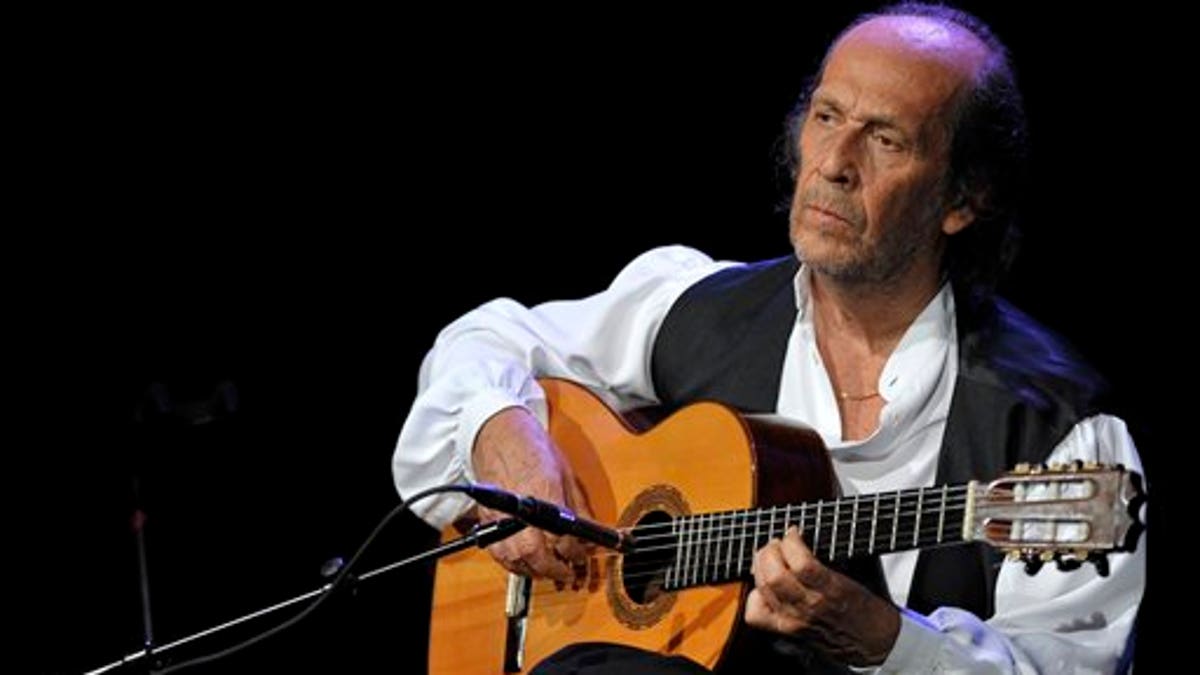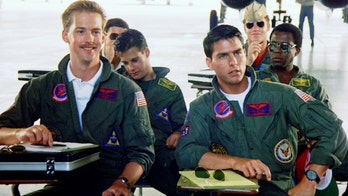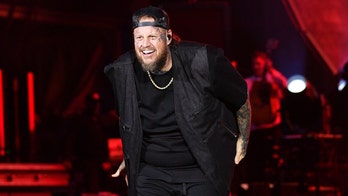
FILE - In this July 8, 2010 file photo, Spanish flamenco guitarist Paco de Lucia performs on the Miles Davis Hall stage at the 44th Montreux Jazz Festival, in Montreux, Switzerland. Spanish officials said Wednesday Feb. 26, 2014 that world-renowned flamenco guitarist Paco de Lucia has died. He was 66. Jose Ignacio Landaluce, mayor of de Lucia's native Spanish town of Algeciras said in a statement Wednesday the guitarist died in Mexico, where he lived.The cause of death was not immediately made known. De Lucia, whose real name was Francisco Sanchez Gomez, was recognized as one of the world's leading guitarists, dazzling audiences with his lightning-speed flamenco rhythms and finger work. (AP Photo/Keystone, Martial Trezzini, File)
MADRID (AP) – Paco de Lucia, one of the world's greatest guitarists who dazzled audiences with his lightning-speed flamenco rhythms and finger work, has died in Mexico, Spanish officials said Wednesday. He was 66.
A spokeswoman for the town hall of de Lucia's native Spanish town of Algeciras cited de Lucia family members as saying the artist died of a heart attack. She said he began to feel unwell while on a beach in Cancun and died while being taken to a local hospital.
A statement from his family published in several Spanish newspapers said, "Paco lived as he wished and died playing with his children beside the sea."
The Algeciras spokeswoman said de Lucia had several houses, including one in Mexico. She spoke on condition of anonymity as town hall regulations do not allow her to be identified publicly.
Describing the death as unexpected and premature, Education and Culture Minister Jose Ignacio Wert said he was "a unique and unrepeatable figure."
De Lucia — whose real name was Francisco Sanchez Gomez — was best-known for flamenco but also experimented with other genres of music. One of his most famous recordings was "Friday Night in San Francisco," recorded with fellow guitarists John McLaughlin and Al Di Meola in 1981.
During the 1960s and 1970s, he formed an extremely popular duo with late flamenco singer legend Camaron de la Isla, with the two working together on 10 records.
His 1973 rumba "Entre Dos Aguas" (Between Two Waters) became one of the most popular recordings in Spain.
De Lucia was awarded the Culture Ministry's Fine Arts Gold Medal in 1992 and the prestigious Prince of Asturias prize for the Arts in 2004. He was granted a Doctor Honoris Causa degree by Berklee College of Music in 2010.
His last studio album "Cositas buenas" (Good Things) earned him his first Latin Grammy in 2004 while his 2012 live recording "En Vivo" (Live) received a second.
Born Dec. 21, 1947, de Lucia was immersed in flamenco music from an early age, with his father, Antonio, and two brothers playing guitar and a third brother an accomplished flamenco singer. He took his artistic name from that of his Portuguese mother, Lucia.
From a poor background, de Lucia's formal schooling ended when he was 11, and he was soon out playing flamenco in local bars. At 14 he made his first record with his brother Pepe, "Los Chiquitos de Algeciras" (Kids of Algeciras).
Although de Lucia had no formal musical training, from an early age he impressed people with his remarkable dexterity, hand strength and technique that allowed him to produce machine-gun-like "picado" riffs so characteristic of flamenco guitar.
"I have always found that the more technique you have the easier it is to express yourself," he told Spain's El Pais newspaper in an interview in 2004. "If you lack technique you lose the freedom to create."
Arguably the most influential flamenco artist ever, he infused new life into the traditional art form and is credited with modernizing it by introducing influences from other musical forms such as jazz, bossa nova, classical and salsa.
Although some of this drew criticism from flamenco purists, de Lucia defined his own influential sound by staying true to his flamenco roots no matter what he played.
His own sextet, formed in 1981, includes bass, drums and saxophone. In addition to his work with McLaughlin and Di Meola, his high-profile collaborations included work with guitarist Larry Coryell, and pianist Chick Corea, who joined Paco's sextet for the album "Zyryah" in 1990.
In 1995 he played with Bryan Adams on the song "Have You Ever Really Loved a Woman".
"Paco was and will be a universal artist, who took the guitar and flamenco sentiment to the heart of the whole world," said Jose Luis Acosta, president of the Spanish Artists and Editors Society.
Follow us on twitter.com/foxnewslatino
Like us at facebook.com/foxnewslatino


























